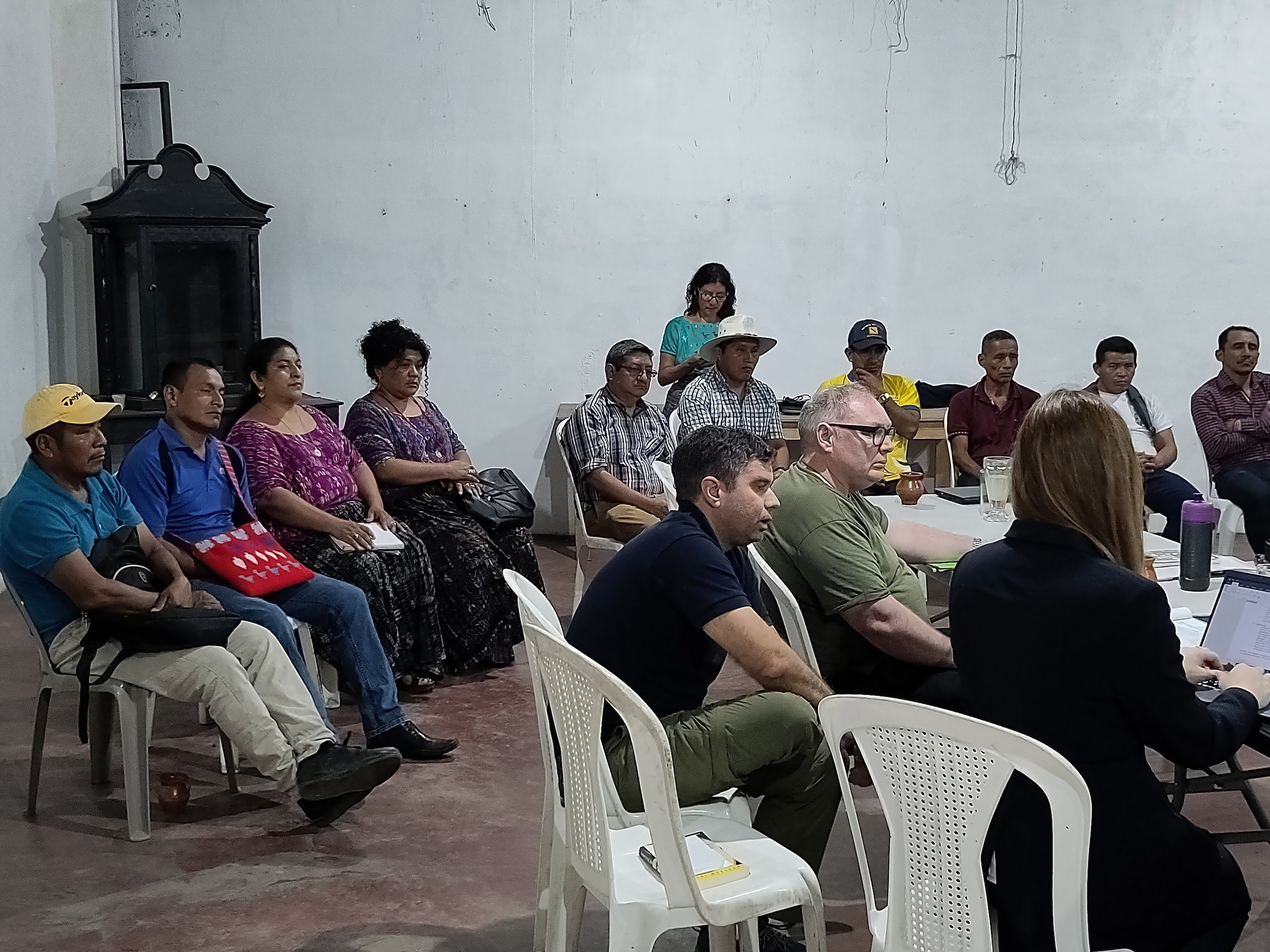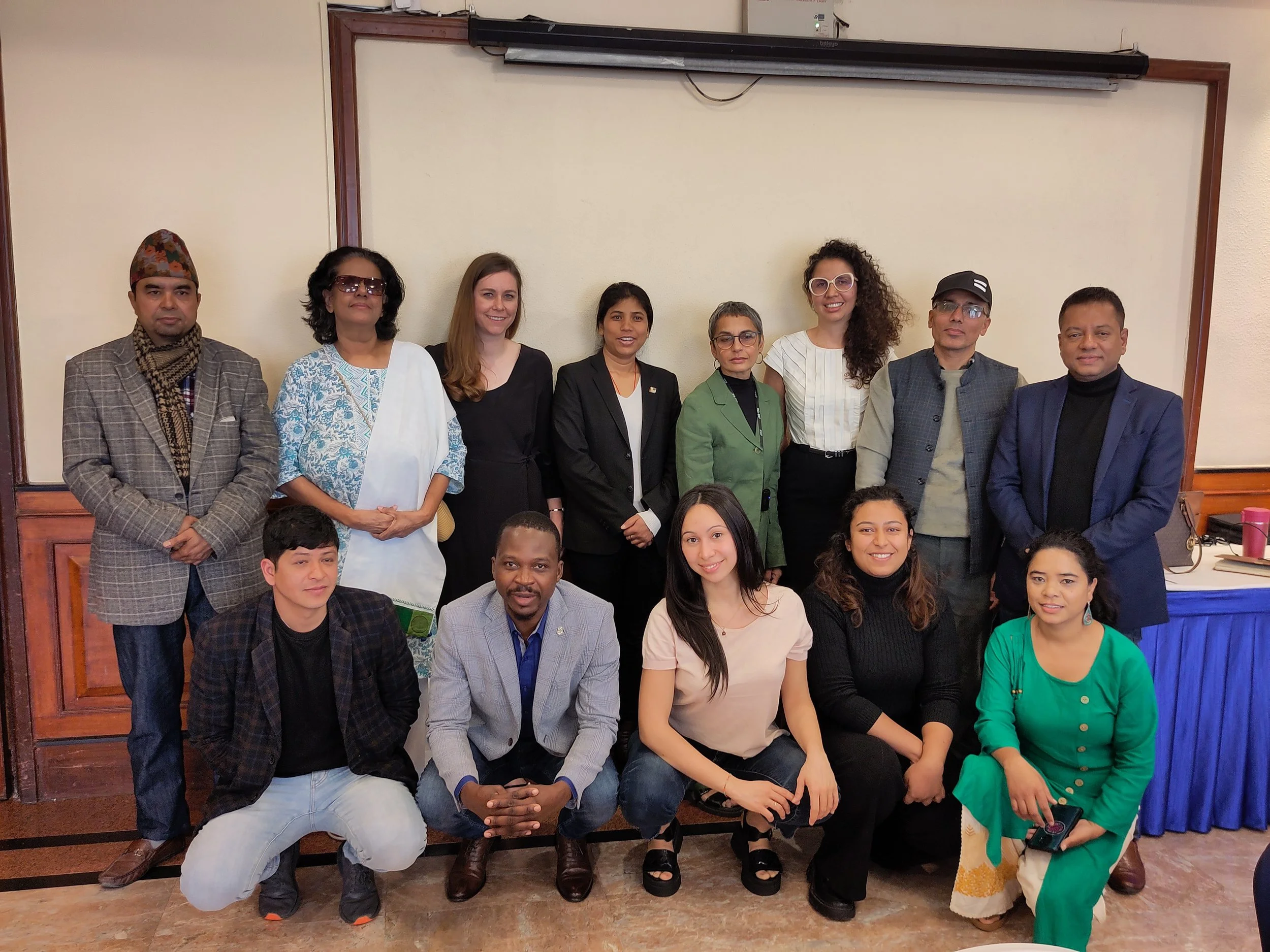The Impact of International Legal Delegations: Strengthening Human Rights in Guatemala and Nepal
In 2023 and 2024, high-level international legal delegations went to Guatemala and Nepal. These delegations, co-designed with local rights holders and supported by PBI, serve dual purposes: providing critical solidarity and legal expertise to human rights defenders, while catalysing broader changes in the rule of law. They have been particularly impactful in preventing targeted attacks, supporting defenders, and triggering lasting reforms.
Preventing forced displacements of Indigenous communities in Guatemala
In March 2023, at the request of local organisations the Union of Campesino Organisations of the Verapaces (UVOC) and the Community Council of the Highlands – las Verapaces (CCDA), a delegation of independent lawyers visited Guatemala and investigated agrarian conflicts and Indigenous peoples' rights in the Alta Verapaz region. The delegation met with four Maya Q’eqchi communities (the Nuevo Chintún, Lajeb Kej, Choctun Basilá and Rio Cristalino communities), who all recounted land-grabbing, violence, threats, intimidation, criminalisation and forced evictions. The delegation also held meetings with representatives of state authorities, the private sector, the diplomatic community. The resulting report, “We are not trespassers: this is our land” - Agrarian conflict and Indigenous peoples’ rights in Alta Verapaz” assesses the deteriorating human rights situation of rural indigenous communities in the Alta Verapaz region, documents the legal situation of several communities and lays out a series of recommendations. Published in October 2023, the report has had profound effects on the ground.
Key among these impacts has been the prevention of forced evictions of Indigenous communities, particularly the Maya Q’eqchi’ community of Lajeb Kej, one of the groups visited by the delegation and documented in the report. The community faces persistent threats of violent eviction from a constellation of governmental, criminal and business interests. In May 2023 a swift mobilisation of international legal support, including urgent letters to Guatemalan authorities reminding them of their international obligations, ultimately prevented an eviction that had been threatened. This is a prime example of how timely international solidarity can provide a critical buffer and prevent attacks against human rights defenders.
Linking defenders and human rights lawyers
Since the report's release, there has been notable impacts of this connection between defenders and delegates. One of the delegation's lawyers, Daniel Cerquiera from the Due Process of Law Foundation (DPLF), continues to support cases related to forced evictions in the Verapaces region. Collaborating with Guatemalan organisations UVOC and CCDA, Daniel helped bring a case before the Inter-American Commission on Human Rights in July. During the hearing, Indigenous leader Sandra Calal presented harrowing testimonies of forced evictions affecting Indigenous communities, which include the burning of homes and crops, physical violence, and a lack of due process.
Additionally, two other delegation lawyers, Camila Zapata Besso and Margarita Cornaglia, worked alongside UVOC, CCDA, and other human rights groups to submit an amicus curiae brief for another Inter-American Commission case, addressing climate emergency impacts in Chile and Colombia. This brief uses evidence from the Guatemala report to underscore the obligations of states to protect Indigenous and Afro-descendant communities in the context of climate change, illustrating how failures in environmental policy directly endanger these vulnerable populations.
PBI's 2023 global annual report also highlighted this mission, amplifying the visibility of the delegation’s work in Guatemala and the enduring importance of international accompaniment in human rights.
Moving the dial on rule of law in Nepal
After hearing about the Guatemala delegation, civil society organisations in Nepal asked that PBI help facilitate a similar initiative. In March 2024, legal delegates from Colombia, Côte d'Ivoire, Sri Lanka, the UK and the USA travelled to Nepal to examine the country’s transitional justice process in the wake of its decade-long civil conflict. The lawyers travelled to Kathmandu, Nepalgunj, Bardiya and Janakpur, meeting victims of human rights violations committed during and since the conflict, members of the judiciary, civil society organisations, local and national government, diplomats, journalists and UN representatives, to assess the rule of law and access to justice. The Delegation’s report ‘Peace without Justice and Accountability? A Caution Against Impunity in Post-Conflict Nepal, launched in October 2024, marked a pivotal moment in Nepal's transitional justice journey.
“We have finally got a law on transitional justice. This is the result of years and years of advocacy and campaigning by civil society. But this delegation added one more step, to encourage legislators to get this over the line. A report that analyses the legislation independently will be a tool to help us to advocate for the law’s effective implementation and, finally, justice for victims and their families. We will continue to need the international community’s support in this endeavour”
In August 2024, just a couple of months after the delegation, Nepal passed its long-awaited transitional justice legislation which is expected to kick off the long-awaited process of accountability in the country. This is a huge step in the right direction and the delegation was able to witness passage of this bill, which had been long stalled during a ten-year legislative impasse. When the delegation met with diverse actors, they had raised concerns regarding the proposed bill that was pending before the parliament. Local groups have said that - by spotlighting the needs and concerns of conflict victims and rights groups, while bringing fresh legal expertise to the desks of decision makers - the delegation contributed additional momentum to that which had been built over many years by local and international actors to ensure the bill’s passage. Despite the law’s shortcomings, its passage represents a vital shift in the steady deterioration of Nepal’s rule of law. The report, and the delegation’s ongoing advocacy around it, provide legal analysis of the law’s gaps together with recommendations for addressing them.
The report garnered substantial attention from the Nepali press, with journalists attending both in-person and online. This coverage included features in leading publications such as Kantipur Daily, The Kathmandu Post, South Asia Time, My Republica. underscoring the report’s significant reach and influence.
Why have these delegations been so powerful?
Inclusive and Co-Designed Approach: The delegations were initiated at the request of local human rights defenders and were co-designed with direct input from marginalised groups, defenders, and grassroots organisations. This ensured that the plans, meetings, messaging and agendas were closely aligned with the real challenges and needs faced by these communities. This approach exemplifies allyship and solidarity, where interventions are moulded to meet the needs of local groups, rather than being externally imposed.
Timely and Strategic Engagement: The timing of the delegations was critical, with meetings and recommendations reaching key decision-makers when eviction orders were pending in Guatemala and discussions around transitional justice were gaining momentum in Nepal. This strategic timing amplified the impact of the delegation’s findings and helped give a vital boost to the efforts of local groups who have fought for these issues for decades.
Thoughtfully Composed Delegations: The Nepal delegation proved an example in strategic composition. Experts came from Africa, Asia, Europe, and Latin America, The delegates from Colombia and Sri Lanka brought first-hand experience of transitional justice issues, while participants from Côte d'Ivoire, the UK and the US brought practical experience from previous international delegations, as well as their own legal expertise. This global composition, specifically requested by Nepali defenders and lawyers, ensured that the delegation's messages resonated effectively with the fiercely independent Nepali authorities. The perspectives shared by these delegates, informed by their own countries' transitional justice processes, provided Nepali stakeholders with relatable insights and practical examples, fostering a collaborative dynamic. Similarly for the Guatemala delegation, regional legal experts from Colombia, Peru and Brazil were recruited to the delegation where their experience of similar land conflicts and corporate-criminal collusion and state corruption provided expert comparative context and helped build solidarity.
4. Part of a wider strategy for catalysing international connections for long-term support: These delegations were not one-off activities but part of a broader holistic strategy to support local groups. These strategies fused reports, public events, speaker tours, advocacy meetings, and ongoing legal and advocacy support. They were also underpinned by PBI’s long-term presence in both countries and an attention to the security of local activists. The delegations were one piece of a longer-term approach, as exemplified by the cases taken by delegates to the Inter-American Commission following their reporting on Guatemala. This demonstrates how coordinated legal, advocacy and security efforts can sustain momentum for defender protection and respect for rights long after the initial intervention.
From the outset, these delegations were designed with a commitment to amplifying the voices of marginalised groups. By grounding the activity in local perspectives, holding strategic consultations, and aligning with the timing and sensitivities of the local context, these delegations provided culturally informed, focused interventions that catalysed significant reforms in Nepal’s transitional justice process and offered protection to Indigenous communities in Guatemala.
Support from the UK
These reports have provided an opportunity for the UK government to engage with human rights defenders and work to address the challenges set out in the reports. The reports of the delegations serve to highlight human rights issues in countries which often don’t get much attention in the UK Parliament, while flagging the importance of international support to remedy violations. The legal framing in the reports has facilitated governmental and inter-governmental engagement in the UK and elsewhere.
Standing on the shoulders of local defenders
The successes of the legal delegations in Guatemala and Nepal are ultimately the successes of the local grassroots groups - like UVOC and CCDA in Guatemala; Advocacy Forum and the Conflict Victims Women’s National Network in Nepal - who have struggled for decades for land rights, access to justice, and the rule of law in the face of smear campaigns, threats, attacks and killings. The delegations, became tailor-made tools that landed precisely when and where they were needed, supporting local struggles in the most impactful way.
➜ Read a summary of the report on agrarian conflict and Indigenous rights in Guatemala here!
➜ Read a summary of the report on transitional justice in Nepal here!
➜ Get updates on future initiatives and how you can help support threatened defenders by signing up to PBI UK’s newsletter here !




